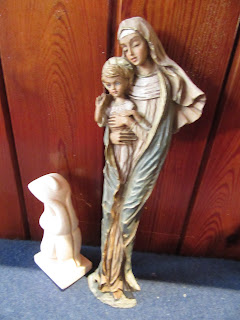Does the Bible Say that Mary Was a Virgin?
When I was at school, my classmates (who hadn’t studied the Bible in much detail, but assumed that they knew more about what it said than I did because they weren’t Christians) sometimes tried to tell me that the Bible nowhere mentions the Virgin Birth. They said that the whole idea just arose from a mistranslation, and that the word translated as ‘virgin’ simply meant ‘young woman’.
Like many
factoids, this one has an element of truth.
As I discussed in yesterday’s post, the line in Isaiah which Matthew quotes as “The virgin will conceive and give
birth to a son, and they will call him Immanuel” might, in the context of the
original passage in Isaiah, not refer to a woman miraculously becoming pregnant
without ever having had sex.
Nonetheless, the
gospel stories told by both Matthew and Luke do seem to say that Jesus was
miraculously conceived without Mary having had sex. At any rate, they emphasise that he wasn’t
Joseph’s son.
Matthew tells
the story of Mary, a young woman engaged to be married to a man named Joseph,
being discovered to be pregnant. Joseph,
‘being a just man’, decides to divorce her privately so as to avoid exposing
her to public humiliation and the risk of being stoned to death for adultery.
No-one could
call Joseph ‘a just man’ if he had dumped his fiancée after getting her
pregnant. The implication is clearly
that he knows that he hasn’t had sex with her, logically concludes that she has
had sex with someone else, and feels hurt and betrayed. Mercifully, an angel appears to him in a dream
and explains to him that Mary has not been unfaithful to him, but that she has
become pregnant by the Holy Spirit, and that she will have a son and must name
him Jesus, because he will save people from their sins. So Joseph takes Mary as his wife, but doesn’t
have sex with her until after her baby is born.
Luke tells the
story from Mary’s point of view. An
angel appears to Mary and announces to her that she is about to get pregnant
and will give birth to a son and must name him Jesus, and that “He will be
great and will be called the Son of the Most High. The Lord God will give him
the throne of his father David.”
Well, if you
were a virgin teenage girl who received a message like that, what would you make
of it? Evidently, Mary can gather from
the reference to the ‘throne’ that the baby is a descendant of King David
(whether through her ancestry or her husband’s) and that ‘father’ here means ‘ancestor’,
not that she is about to be impregnated by some guy called David instead of by
her fiancé whose name is Joseph.
‘The Most High’
sounds like a reference to God – but maybe it sounds more unambiguously like
that, written with capital letters in our Bibles, than it did to Mary. And at any rate, ‘son of the Most High’ doesn’t
have to mean literally fathered by God rather than by a human father – when
Jesus said, ‘Blessed are the peacemakers, for they shall be called the children
of God,’ he didn’t mean that anyone would assume that people who make peace are
literally begotten by God, but that they show God’s nature by acting in
accordance with God’s love.
So, reasonably,
Mary asks the obvious question about her pregnancy: “How can this be, since I am a virgin?” or, as the King James Version literally
translates the words from the Greek text: “How shall this be, seeing I know not
a man?” The idiom ‘know’ for ‘have sex
with’ isn’t one we use much today, so perhaps a semi-literal translation like, “How
can this be, since I have not had sexual relations with a man?” is more helpful.
At any rate,
Mary definitely isn’t asking, ‘How can I be pregnant when I am a young woman?’
which would imply that she was not merely innocent but hopelessly naïve. Okay, even nowadays with sex education
lessons in schools, some teenagers are
naïve enough to have unprotected sex and are surprised when they get pregnant. But I imagine that, in a rural community in
an era when entire families slept in the same bed, so that a parent couldn’t get up in the night to answer the door without risking waking their sleeping children, young people grew up knowing the facts of life from observation rather than
from classroom lectures that they could easily tune out.
The angel
replies “The Holy Spirit will come upon you, and the power of the Most High will overshadow you; therefore also the Holy One being born will be called the Son of God.”
So this is the
story told in two of the gospels. But
did it really happen like that? And did
Mary have a choice? I will try to
discuss this in a follow-up blog.



Comments
Post a Comment